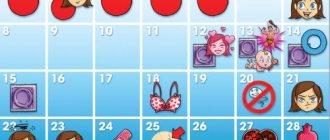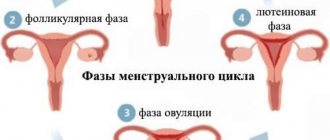What are periods in girls and women and why are they needed: biology
Menstruation in girls and women is necessary to ensure reproductive function.
From the point of view of biology, there is such a thing as “menstruation” or “menstruation”. What are periods in girls and women and why are they needed? Here is the answer:
- Menstruation is a normal physiological process in which the lining of the uterus sheds and comes out through the vagina.
- It is called menstrual fluid.
- It often happens that women complain about their menstrual periods. In other words, premenstrual syndrome. All this is not in vain, because the menstrual cycle has a strong influence not only on mood, but also on physical condition.
Few people know that critical days are quite rare in nature. Not all mammals have menstruation, but only the so-called higher primates (chiropterans and jumpers). A reasonable question arises: how is it that not all female animals have periods? Answer:
- The fact is that mammals are divided into two types: primal beasts and real animals.
- The first are those who lay eggs, and the second are those who give birth to children.
- Of course, the babies are more developed if they are born right away, rather than hatching from the shell. However, this is not all the ramifications.
- Real animals are divided into marsupials and placentals. The second type includes people.
- In turn, placentals include living beings with a menstrual cycle and an estrous cycle.
Menstruation renews the epithelium of the uterus, which should come out as unnecessary. Through this process, the uterus can renew itself and prepare for pregnancy next month. Thus, periods also act as reinsurance. If fertilization does not occur, then the body gets rid of the endometrium and everything that has accumulated during the cycle. So there is no need to be afraid of critical days. They help the body get rid of unnecessary substances that can harm health.
Questions to answer
Since telling your daughter about her period with all the details is quite difficult, it is worth preparing for the conversation in advance and thinking about how to answer questions that may arise during the conversation. Often a teenager is curious about how painful critical days are, how many days they last, and what to do if they start unexpectedly? If a boy is growing up in the family, you also need to talk to him about this topic, but the conversation can be shorter and more general. We will try to answer the most popular questions from children about menstruation.
Do periods hurt?
The girl may worry that the bleeding is accompanied by pain. It is necessary to explain that usually the adjustments are painless, only at the beginning of the cycle discomfort may occur in the lower abdomen. However, each girl experiences her own sensations and some complain of abdominal pain, upset bowel movements, and dizziness. It is also worth talking about the fact that before menstruation, the breasts swell and become painful.
What is the menstrual cycle: diagram
The menstrual cycle or menstrual cycle is the intermediate time from the first day of the last menstruation to the first day of the next. As a rule, the cycle begins to count from the day when menstruation begins. Typically the cycle lasts from 21 to 35 days . If critical days do not fit into this schedule, then this is no longer normal and you should consult a doctor. Here is a diagram of the menstrual cycle:
Menstruation cycle diagram
The menstrual cycle is especially helpful for women who want to become pregnant. Using the menstrual calendar, they can calculate days favorable for conception. The medical term for this period is ovulation. During this period, pregnancy occurs with a high probability, compared to other days of the cycle.
Please remember: You can stick to this regimen if you have a regular cycle. If there are deviations, then calculating the days of ovulation is much more difficult.
Failure of the menstrual cycle can be normal only in the following situations:
- When a teenage girl just starts menstruating
- After childbirth
- During menopause
In all other cases, cycle failure is negative and may be a sign of a serious illness.
What is not worth talking about?
You can talk about regulations in your own words, and you can also build a conversation according to your own ideas. However, you should not scare the child and tell the young girl about any complications that are quite possible:
- You cannot limit the time of the first menstruation (menarche) to strict limits. A girl who hasn't had her period at 13 will think she has some kind of abnormality. It is better to wait a little and consult a pediatric gynecologist.
- You should not prepare your daughter in advance for the fact that periods are painful, otherwise she will increase her fear in anticipation. Also, one should not give them too little importance, saying that menstruation goes unnoticed. This process is physiological, you should prepare for it in advance, but do not give up your habits.
- You can’t talk about periods as if their onset is something shameful that should be kept silent about. On the contrary, monthly menstruation is a normal process that happens to every woman. At the same time, you can only talk about them with close people, without making intimate details public.
Talk openly with your child to prepare him for new circumstances. You shouldn’t put off the conversation, because it’s better if a girl learns about menstruation from her mother than from someone else. Such conversations strengthen relationships and help parents better understand their child. It is very important not to lose contact with him, especially on the threshold of a difficult and interesting teenage period.
https://youtu.be/ZpuN_AfDL7o
How to explain to a child what menstruation and critical days are: cartoon
It is necessary to explain to the child what menstruation and critical days are.
Many parents think about whether it is even worth starting a conversation with their daughter on the topic of menstruation. Psychologists and gynecologists have a clear answer: “Yes!” . Of course, the child needs to be privy to all the details. The girl herself does not understand what is happening to her. Until recently, she was interested in cartoons and toys, but now she has hair on her body, her breasts are getting bigger and her mood is constantly changing. Who better than a parent can tell you about a new period in a child’s life. How to explain to a child what menstruation and critical days are? Here are some tips:
- It is important to choose the moment when to tell your daughter about a “piquant” topic.
- Perhaps your child is already showing interest in such topics, or is approaching the age at which her period is about to begin. In this case, you should start a conversation immediately.
- There is no particular need to prepare for it. This is not a celebration. True, not everyone is ready to talk about such frank topics.
- Such parents should choose special literature that will be written in a language that is simple and understandable for the child, and then, on occasion, hand the book to their child.
- You can search for suitable video material. A visual example will make it even clearer.
- You can watch a cartoon on this topic with your daughter, and answer her questions as you watch.
If parents are in the mood for a conversation, then it is best to arrange it in the following sequence:
- It is worth telling the girl that years will pass, and she will turn into a real woman, and then into a mother.
- All women have a reproductive organ that helps bear a child (uterus and ovaries).
- The girl also has these same organs, only they are still small and are just beginning to grow and develop.
- When a certain age approaches (usually 11-14 years ), the body begins to rebuild and prepare the girl for a new stage - future motherhood. At this time, menstruation begins.
- It must be said that bleeding is an integral part of the process, so there is nothing scary or shameful about it.
- It is also worth mentioning personal hygiene. It must be carried out especially carefully on critical days.
- You should definitely warn the girl about PMS. She should know that mood swings, the desire to cry and laugh for no reason are just the consequences of menstruation and will soon pass.
If you properly tune in to the dialogue and behave in a friendly manner, then the conversation on an intimate topic will take place in a pleasant atmosphere and will not put anyone in uncomfortable conditions. Here is a cartoon video that will help your daughter understand what periods are.
When should mom start talking about periods?
You need to start an important conversation at a certain age, when the girl is ready for it. In this regard, mothers can make two common mistakes.
Some remain silent until the last moment and explain something to their daughter only when the critical days have already begun. Meanwhile, a child’s blood is always associated with pain and injury. A lack of understanding of the situation can provoke severe fear and even mental trauma.
Misunderstanding of the situation can provoke severe fear and even mental trauma in an unprepared child.
In this regard, I recall a striking episode from Colleen McCullough’s novel “The Thorn Birds.” When the main character, fifteen-year-old Maggie, started menstruating, she was terribly afraid of it, hid it from her family and for several months thought that she was dying of a “shameful intestinal disease.” As a result, it turned out that the priest of the local church, and not the mother, was forced to explain the truth to the girl.
She clenched her hands.
- Father Ralph, I’m dying, I have cancer!..
“It’s been six months since this started, Father Ralph.” I have terrible pain in my stomach, but not because I feel sick, and... oh, Father Ralph... there is so much blood flowing!
Father Ralph raised his head sharply; this never happened during confessions; he looked at her shamefully lowered head, overwhelmed by a storm of contradictory feelings, and could not gather his thoughts.
Absurd, joyful relief; wild anger at Fiona [ed.
: girl's mother] - he was ready to kill her; awe, admiration - such a little thing carried on so bravely all the time; and immeasurable, inexpressible embarrassment...
“You’re not dying, Maggie, and you don’t have any cancer.” I shouldn’t be the one to explain this to you, but I’ll explain it better. Your mother should have told you everything a long time ago, prepared you in advance, I can’t imagine why she didn’t do this.
McCullough Coley
https://rubook.org/book.php?book=35004&page=52
To prevent such a situation from happening, the mother needs to start the conversation on time, in advance - when her daughter is about ten years old (after all, in modern girls, puberty begins earlier than, for example, twenty years ago).
Another mistake adult women make is that they proceed from their past experience and begin to educate their child at the age when they themselves learned about menstruation. However, each organism is individual, and in such a delicate matter one cannot be guided by heredity alone.
In general, a mother should listen to her feminine intuition, and also observe external changes in the girl’s body. So, the following signs will become signal:
- Sharp body growth.
- Enlargement of the mammary glands.
- The appearance of hair in the armpits and pubic area.
- Acne on the face, increased oiliness of the skin.
- Changes in the psyche and behavior: the girl becomes more abrupt, irritable (the work of hormones affects).
- Periodic mild cramping pain in the lower abdomen.
Photo gallery: signs that a girl is about to start her period
When puberty begins, many girls begin to have problems with their skin. One of the signs of puberty is the appearance of hair in the armpits and pubic area. If a girl's breasts become rounder, then her first period is just around the corner. Shortly before her first period, a girl may periodically be bothered by cramping pain in the lower abdomen.
Of course , a confidential conversation should be conducted by the mother. If this is not possible, then this role should be taken on by the grandmother, older sister or godmother.
Video: when and how best to start a conversation with your daughter about periods
How to successfully organize a conversation
It is important to start an intimate conversation correctly. There is no need to do this very abruptly (go straight to the point). If you tear a girl away from some activity, sit her down in front of you and announce with a serious look that she is now learning something very important, then the child may simply withdraw into herself or subconsciously perceive the information negatively.
The wrong moment can ruin an entire important conversation.
It is best to choose a time when the mother and daughter are alone at home, the girl is not particularly busy with anything and is definitely in a good mood. Alternatively, you can talk while walking, for example, in a cozy square or park where there are no people nearby.
It’s good to start the conversation by discussing related topics, for example, noticing how your daughter has changed lately (prettier, seems more mature), and then smoothly move on to a topic that worries her mother.
A woman must also provide for a soft tone of conversation, inviting facial expressions (no need to make a too serious face), and gestures.
An appropriate tone, smile, tactile contact are the keys to a successful conversation with a child.
An interesting technique is to initially arouse the girl’s curiosity: for example, show the pad and ask, “Do you know what this is? Are you wondering why this is needed?
You can pique your daughter's initial interest by showing her the pad.
Video: preparing my daughter for her first period (video from the Always company)
What aspects to pay attention to and what not to focus on
It’s good to build a conversation about menstruation according to a pre-thought-out plan, for example, use this option:
- Stages of child development, the difference in the physique of a girl and a girl. Here it is worth activating your daughter’s existing knowledge: let her tell everything she already knows and ask what interests her.
- What is menstruation, its harbingers in a girl. Time of onset of menarche (first menstruation). Cycle length.
- Features of personal hygiene during critical days, what should not be done during critical days.
- Possible problems associated with menstruation (for example, prolonged absence). Here it is important to focus on balanced nutrition. After all, many teenage girls inadequately evaluate their appearance and begin to exhaust themselves with diets. This leads to cycle disruption.
It is not at all necessary to “post” the entire amount of information at once. The conversation can be carried out in 2-3 stages. It’s very good to use your own experience: talk about your experiences during the same period.
The daughter must understand that menstruation is a completely natural process that marks the transformation of a girl into a girl . And the mother has the power to imagine everything in such a way that the child will not only not be afraid of first blood, but will begin to look forward to this event as a holiday.
A mother has the power to convince a girl that menstruation is a joyful event in life.
It is very important to explain to the girl that menarche occurs at different ages. And if her classmates are already having their period, this in no way means that they are better and more mature.
In this regard, my classmate Yulia comes to mind. Until the 9th grade, the girl was small in stature and had a “childish” physique. She had not yet had her period (she herself admitted this), which caused ridicule from many other, more “adult” women her age.
After 9th grade, Yulia left school, and I did not see her for several years. Imagine my surprise when one day at an alumni meeting I saw a tall, busty girl (she later became the mother of two children).
So the late onset of menstruation does not at all indicate a lack of femininity and inferior reproductive function.
There are things that it is better not to touch upon in the first conversations about menstruation, so as not to cause unnecessary fears in the girl:
- Possible very painful sensations during menstrual periods. This also includes stories about birth pangs.
- Deepening into the issues of sexual intercourse, loss of virginity, sexually transmitted diseases. Of course, all this is very important, but it is a topic for a separate conversation, which is not yet time for 10-11 years. If a girl has any questions in this area, the mother does not need to avoid answering, blush, but briefly explain in age-appropriate language, without going into details.
Video: animated video about periods for children
Reviews from moms
Modern children grow up early, and learn about many important aspects of life and health on the street, from TV and the Internet. Therefore, mother should hurry up and talk to her daughter about menstruation in time. This needs to be done delicately, choosing the right moment and highlighting all the important issues for this topic.
- Larisa Morozova
How to explain to a guy what menstruation is: options
Just explain to a guy what menstruation is
Despite the fact that in the modern world young people are more sexually liberated, some young people are still not comfortable talking about menstruation. There are such shy girls who are afraid to even tell their boyfriend that they have started their period. However, you should understand that there is nothing shameful in this. This physiological process is inherent in nature, and it is simply necessary for the normal functioning of the female body. It is only important to choose the right words. How to explain to a guy what menstruation is? The options will be described below.
Usually a conversation about this situation arises when a guy hints at sexual intercourse. You can say it directly or veil everything with two words “critical days” . If the guy is understanding, then he will not insist on continuing. However, if a couple in love is still young and they have not had sexual contact, then it is not at all necessary to go into details of the menstrual cycle.
If the situation has reached the point where it is simply impossible not to talk about menstruation, then there are several tips that will help explain everything clearly and accessible:
- If the boy is a teenager, then the conversation should be approached with extreme caution. During this period, he may not fully understand the words, and generally react poorly.
- If the guy is older, it's much better. He is already emotionally strong and mature to receive such information.
- No matter how old a guy is, you should speak to him softly and carefully. There is no need to be rude and annoying. Also, don't feel guilty or somehow different.
- If you can’t get rid of embarrassment, then you should use veiled words. For example, instead of “I’m having my period,” you can say “I’m having my period .
If a guy really values his girlfriend, then he will try to understand and accept everything.
When and how should girls be told about menstruation?
Children grow very quickly, and there comes a time when the child's body undergoes a radical transformation. Hormones begin to activate in the girl’s body, which change her physiological processes.
The changes that are taking place indicate that it is time to start talking about menstruation. Many mothers put off this moment, not knowing at what age and how to tell the girl about her period.
How old should she be: at what age should she tell?
Usually, information about menstruation is conveyed to girls by mothers or female family members. The most difficult thing in this case is to find the answer to the question of how old the girl should be. The popular doctor Komarovsky says that mothers make two types of mistakes.
Some parents remain silent until the very last moment and start talking only when menstruation has already begun. A child always associates blood with pain and damage, and a lack of understanding of what is happening leads to severe fear.
This development of events is fraught with psychological trauma for the girl.
Other parents come from their own experience and try to tell and convey information at the age at which they received it themselves. This approach is also not correct. Heredity plays a big role, but is not the determining factor at what age it is necessary to talk about the cycle.
Komarovsky in his programs talks about the age of puberty for girls in the period 8-13 years. Today, the average age for menstruation to begin is 10-11 years. How old a child must be to start a conversation is determined individually.
If menstruation begins before the age of 10 or does not occur upon reaching the age of 16, then this is a cause for concern and a signal to contact a gynecologist.
In all other cases, it is necessary to be guided by your own intuition, pay attention to external changes in the child’s body and determine individually at what age it is necessary to convey important information.
Signals to start a conversation
The girl’s body is preparing for the start of the menstrual cycle, which is inevitably reflected in her appearance. In about a year, the girl experiences a sharp growth that can reach 12 cm. A disproportionate change in body parts occurs, the foot and hands become greatly enlarged. A harbinger of the imminent onset of menstruation is the appearance of the following signs:
- rounding of the mammary glands;
- the appearance of increased oiliness at the hair roots;
- the appearance of hair in the pubic area and armpits;
- the appearance of an oily sheen on the face, rashes in the form of pimples and blackheads.
In the period before the onset of menstruation, a girl experiences sharp changes in behavior, previously unusual features and abrupt behavior appear. When such signals appear, you need to prepare for how to tell a girl about her period.
How to talk about your period: basic recommendations
The ideal option would be if the girl herself begins to ask questions about the beginning of the menstrual cycle, but in practice this is extremely rare and parents have to initiate the conversation.
Some parents find it difficult to independently create a conversation plan and determine at what age to do this, so you can use special manuals, cartoons on the topic of puberty, and videos from Dr. Komarovsky’s school.
There is no need to immediately lay out the information in full, so the conversation can be divided into several stages. During the first conversation, it is enough to convey general information and in no case touch upon the possibility of pain or childbirth. There may not be any painful consequences, so you shouldn’t scare the girl in advance.
Starting a conversation
You can’t start a conversation abruptly, or immediately start with a story about menstruation. It is not recommended to take the child away from class, sit him in front of him and focus on the importance of the upcoming contract. Such a beginning will lead to the child immediately closing down. The conversation should proceed smoothly while discussing other topics. There should be no sudden changes:
- intonation;
- facial expressions;
- speech speed.
It is necessary to convey to the girl the information that the onset of menstruation is a natural process necessary for turning her into a woman. Mom can share her own experience, talk about her own experiences and feelings during this period. Such a story will show the girl that such events happen in the life of every woman, and there is nothing wrong with that.
Today, many teenagers consider actresses as idols who have ideal figures. It is worth explaining to the girl that the changes taking place in her body are preparing her for such a transformation.
Plan to talk about periods
It is worth thinking through a preliminary plan for the conversation in advance. This preparation will avoid confusion and direct the conversation in the right direction. It is worth paying attention to the following nuances:
- the tone of the conversation is friendly, calm communication;
- a place of communication - a comfortable place that allows you to relax;
- main points of conversation
Children develop differently, so understanding the essence of the information conveyed may vary. For a child aged 9 years, it is enough to explain that the body will soon change, and discharge is possible, which should not be feared, since this is natural and there are special hygiene products.
At the age of 11-12, explanations should be more detailed and specific. The girl must understand why this happens and what actions should be taken. It is necessary to highlight the following points of menstruation:
- why it happens;
- at what age does it start?
- process features;
- symptoms and possible pain;
- procedures and existing hygiene products;
- what is not recommended to do during menstruation;
- features of cycles.
What is important to tell?
It is worth mentioning that the time of the onset of the first menstruation in girls may differ and the time of their appearance individually. The onset of discharge is not a pathology and depends on the speed of puberty.
It is recommended to prepare the child for the possibility of pain in the first days of menstruation and explain that this is a natural reaction of the body.
It is impossible to predict the presence of pain, but such a warning will help prepare the girl psychologically.
It is worth explaining what hygiene products exist and how they should be used. The mother must purchase everything she needs in advance and show her daughter where the storage location is. The girl must understand how to control the process and how many times the hygiene product should be changed.
It is necessary to focus on the need for specific features of the adoption of water procedures during this period. When taking a shower, you should not make the water too hot, and you should avoid taking hot baths and visiting saunas.
Such basic knowledge of personal hygiene rules will help you avoid health problems and cycle disruptions in the future.
It is imperative to talk about the rules for maintaining a menstrual calendar. At first, it is recommended to conduct it together with the child. This approach will allow you to control the process of menstruation and accustom the girl to order, allowing you to accurately determine how long the cycle lasts.
Read more about maintaining a women's calendar >>
You should be prepared for the fact that the child will ask questions during the conversation. It is necessary, if possible, to answer them truthfully and completely enough and not try to avoid uncomfortable questions.
If a child doubts the truthfulness or receives an incomplete answer, he will most likely look for information on the Internet or peers, which in most cases is not a very good source.
What you should pay attention to?
Even if the conversation took place and the problem of how to tell a girl about her period was resolved, you should not relax. It is necessary to monitor the regularity of the menstrual cycle, as it can be disrupted due to excessive loads and stress. It is worth minimizing the influence of such factors as much as possible.
About the duration of the first menstruation >>
Some parents, thinking about how to tell a girl about her period, try to avoid talking about a possible pregnancy, which is a serious mistake.
A girl should have a complete understanding of the processes occurring in her body and understand that the onset of menstruation is not only one of the signs of growing up.
For the female body, the existence of a menstrual cycle means the possibility of pregnancy.
What are scanty and heavy periods: what does it indicate, reasons
Scanty and heavy periods occur with pathologies
. It is considered normal if a woman does not experience any discomfort during menstruation. However, this is not always the case. Many have often encountered the fact that instead of menstruation, spotting occurs, or even that same discharge begins to appear in large volumes. All this indicates a pathology with the body. It's important to figure out what went wrong. But first, let's figure it out:
What are scanty periods:
- The medical term for this process is hypomenorrhea .
- This is a reduced amount of bleeding during menstruation - 50 ml or less .
The following factors may indicate:
- Stress
- Great physical activity
- Infection
- Disease of the genital organs
- Age-related changes
- Weight changes
- In some cases, even pregnancy
Heavy periods:
- This is regular menstrual bleeding. They can occur once every 2-4 weeks .
- They are accompanied by large blood loss and often provoke the development of anemia.
As a rule, they go for only one reason:
- The body has pathologies associated with the female genital organs and more.
Whatever it is, it’s worth visiting a doctor in any case. It is worth understanding that menstruation should not bring pain and discomfort, increase or decrease the rate of discharge, change color and smell. Any changes in the menstrual cycle may be a signal of a serious illness that can only be diagnosed by an experienced doctor.
Give the best
A lot depends on the mother’s reaction and her ability to correctly present information about menstruation. Not only how the girl will accept new changes in herself, but also how she will relate to sexual life in the future. At first glance, this moment is not monitored and remains hidden for a very long time for the grown daughter, partially influencing her life scenario.
If a mother talked about the peculiarities of female physiology as a punishment for a woman, or she herself reacted to them with shame or as an ordeal: “I’m suffering, daughter, now your time has come to suffer,” this will definitely affect the daughter, her feeling like a woman.
Your daughter will remember your conversation for many years. Therefore, if you are not confident in yourself, it may be better to give the girl a book on the topic of puberty and offer your comments if something is not clear.
But it is not only through talking about menstruation that a mother conveys the image of a woman to her daughter. Therefore, it is better if the upcoming conversation with her daughter becomes a serious reason for the mother herself to think about her attitude towards sexuality and femininity. Think about it and not pass on your anchors, clamps and misconceptions to your growing daughter.
What is the length of the menstrual cycle?
Duration of the menstrual cycle
The duration of the menstrual cycle is the days from the beginning of menstruation until the onset of the next one. In the first year after the start of a girl’s period, the cycle can range from 20 to 50 days . Four years later it is already from 21 to 35 days .
In premenopausal age, the cycle usually lengthens to 50 and even 60 days . The duration of the menstrual cycle is an indicator of whether the female body is functioning normally or whether there are problems in it.
Hygiene during menstruation and hygiene products.
Our girl has never experienced menstruation before and you must explain how to properly take care of yourself during “these days.”
What to use?
Of course gaskets.
They come in every taste and color.
1) Absorbency is determined by the “drops” on the packaging. From 4 (for not very intense discharge, to 8 (nightly).) Find together which ones are right for her, start with 4 drops.
2) Thin (absorbent gel) or thick (cellulose). I recommend starting with cellulose filler (sometimes the “gel” causes irritation of the delicate skin of the perineum and labia).
3) Flavors. Start with unscented pads (again, allergies) and the girl should know exactly what normal menstrual flow smells like.
4) With or without wings is a matter of taste. I would recommend starting with products “with wings”, she will be calm that nothing will “leak”.
5) Gaskets must be changed every 4 hours or, if necessary, more often.
Make sure that the girl always has a spare pad in case of unexpected menstruation.
Regarding tampons, their use is allowed only in girls who no longer have a hymen and who are old enough to understand the features of their use.
Might be interesting:
Personal hygiene.
Menstrual blood is an excellent breeding ground for bacteria, so it is important to maintain hygiene.
You should wash yourself every time you change a pad, after washing your hands with soap. If there is no shower nearby, in emergency cases you can use wet wipes.
You should avoid taking baths and visiting saunas during menstruation.
Everything needs moderation
. Too frequent and excessive water procedures can lead to the washing out of normal flora, dry skin and mucous membranes.
There is no need to use a washcloth - gentle hand washing is enough.
You only need to wash in one direction: from the pubis to the anus.
Dry yourself only with a personal towel. Give the girl a few pieces of a certain color and teach her to change them regularly. It must be clean and dry. Do not use wet, undried towels.
Soap or gel? What's better?
The soap has an alkaline pH and is not suitable for girls' hygiene. And for adults too. It neutralizes the normal background and harms the natural flora of the vagina.
Among the huge variety of hygiene products, it is better to choose those specially developed for these purposes. Pay attention to products with a neutral pH. Start with products without dyes or fragrances.
Explain to the girl that intimate hygiene products are intended for external use only. There is no need to go deeper. The use of the gel requires thorough rinsing with running water.
When is it necessary to contact a gynecologist?
1) early puberty (up to 9 years).
2) absence of visible signs of puberty (female body) after 14 years, absence of menstruation
3) absence of menstruation after 15 years
4) absence of regular menstruation after 2 or more years from the start of menstruation
6) intolerable pain during menstruation
7) episodes of loss of consciousness, signs of anemia
8) any other symptoms that cause concern.
In conclusion, I want to say, please talk to your children. Otherwise, they will “figure it out” without you, drawing information from dubious sources. Patience and wisdom to you. Often, most of the problems of “fathers and children” lie in a lack of attention and ordinary live communication.
Obstetrician-gynecologist Tretyakova M.A.
How to talk to children and teenagers about puberty, “where do babies come from?” , sexual life, sexually transmitted infections, early pregnancies, how to prepare a child for adulthood, read here:
What is a regular and irregular menstrual cycle?
There are regular and irregular menstruation cycles
. A regular menstruation cycle is when bleeding occurs every few days or varies slightly. This is a completely normal phenomenon, which indicates that everything is in order with the body’s functioning.
If too little or too much time passes between periods in different months, then this case is called an irregular cycle. It may indicate the following symptoms of diseases:
- Polycystic ovary syndrome
- Hyperprolactinemia
- Thyroid problems
- Adrenal disease
- Stress or sudden weight loss
If a deviation in the cycle occurs once, then this may be normal. If such problems recur from month to month, then the girl or woman needs to urgently consult a doctor for advice.
How to successfully organize a conversation
It is important to start an intimate conversation correctly. There is no need to do this very abruptly (go straight to the point). If you tear a girl away from some activity, sit her down in front of you and announce with a serious look that she is now learning something very important, then the child may simply withdraw into herself or subconsciously perceive the information negatively.
The wrong moment can ruin an entire important conversation.
It is best to choose a time when the mother and daughter are alone at home, the girl is not particularly busy with anything and is definitely in a good mood. Alternatively, you can talk while walking, for example, in a cozy square or park where there are no people nearby.
It’s good to start the conversation by discussing related topics, for example, noticing how your daughter has changed lately (prettier, seems more mature), and then smoothly move on to a topic that worries her mother.
A woman must also provide for a soft tone of conversation, inviting facial expressions (no need to make a too serious face), and gestures.
An appropriate tone, smile, tactile contact are the keys to a successful conversation with a child.
An interesting technique is to initially arouse the girl’s curiosity: for example, show the pad and ask, “Do you know what this is? Are you wondering why this is needed?
You can pique your daughter's initial interest by showing her the pad.
Video: preparing my daughter for her first period (video from the Always company)
What is spotting during menstruation: what does it indicate, reasons
Spotting during menstruation occurs for various reasons.
If the nature of menstruation changes, then this may be the body’s response to an adverse effect. Spotting during menstruation is small amounts of blood discharge. May be brown or somewhat watery. Worth knowing:
- At a young age, when menstruation has just begun, spotting is the norm, since the body has not yet completely rebuilt itself.
- Also normal is spotting after 40 years , when reproductive function gradually fades away.
- In other cases, this may indicate problems with the body.
The causes of spotting are pathologies and various other problems with the body:
- Anemia
- Avitaminosis
- Problems with the endocrine system
- Diseases of the circulatory system and cardiovascular
- Metabolism problems
- Liver and gallbladder diseases
- Infection or sexually transmitted disease
- Mental instability
- Inflammation or cancer of the genital organs
- Gynecological pathology that interferes with menstrual flow
Symptoms that you should pay attention to when spotting:
- Pain in the lower abdomen that radiates to the lower back
- Increased body temperature
- Vaginal itching or burning
- Discharge lasts more than 10 days
All this may indicate serious illness, so you should consult a doctor.
What is a delay in menstruation: what does it indicate, reasons
A delay in menstruation indicates not only the presence of pregnancy.
A delay in menstruation is a violation of menstrual function, manifested by the absence of cyclic bleeding for more than 35 days . Every girl knows the duration of her normal cycle and monitors whether menstruation comes on time. However, it happens that menstruation may not appear at all. This may or may not be a normal reaction of the body.
- If your period is late, teenage girls 12-16 years old , since at this age the menstrual cycle has not yet adjusted.
- Menstrual irregularities after 49 years , as menopause occurs. In the period from 16 to 49 years, a delay may signal the onset of pregnancy.
There are physiological reasons for delayed periods:
- Changing of the climate
- Hormonal changes in the body
- Cancellation of hormonal contraceptives
- After childbirth
Unfavorable situations in case of menstrual irregularities:
- Severe emotional shock
- Physical exercise
- Poor nutrition
- Sudden weight loss
- Diseases of the reproductive system
- Ovarian cyst
- Polycystic ovary syndrome
- Tumor
- Hormonal imbalance
Important: Only an experienced doctor can find out the cause of the delay.
We strive for dialogue
It is not enough to talk in general terms about menstruation; it is important to wait for questions. If your daughter or son doesn’t ask anything after the story, most likely the child is not ready to discuss this issue with his parents
There may be several reasons: the daughter already knows a lot from communicating with her classmates, or she does not trust her parents and is embarrassed to talk about intimate topics.
Both options require careful consideration. What to do if the offspring does not make contact? It is worth waiting a couple of days after the conversation - the teenager may need time to comprehend the information, and a little later he will come to his parents with his questions. If the child continues to remain silent and does not return to this topic, then action is needed. Try to talk again, ask what worries him and what he knows about “critical days”.
Maybe someone has already provided the teenager with distorted information and he thinks it’s shameful to talk about it. We need to try to find out what the offspring is afraid of, what exactly he already knows
It is very important to explain to him what is true and what is fiction.
It happens that the conversation doesn’t work out – you shouldn’t give up. Any conversation is better than silence and ignoring the problem.
Delayed menstruation during pregnancy: why is this considered normal?
A delay in menstruation during pregnancy is considered normal.
As mentioned above, menstruation occurs due to the fact that the epithelium of the uterus is rejected from its body as unnecessary. A delay in menstruation during pregnancy is considered normal, as the uterus prepares for the physiological process - gestation and development of the fetus. The placenta, umbilical cord and other necessary parts for the baby’s life appear in the uterus.
When a woman becomes pregnant, her baby receives nutrients through the umbilical cord, which is connected to the placenta. In nature, in most animals, the placenta is separated from the bloodstream by a barrier. What humans and primates have in common is that the placenta is in contact with the bloodstream, although it is considered a foreign body. Interesting to know:
- An immunological conflict between the fetus and the body can occur during any pregnancy. For example, when the blood type does not match. In addition, the embryo can affect hormone and blood sugar levels.
- If a female dog, for example, can reject a fetus without problems, then in a woman this will not pass without a trace, since the embryo is connected to the bloodstream. Consequently, her health will be at risk.
- That is why nature made it so that the body did not fight for every embryo, but only selected the strongest.
- But even getting pregnant can sometimes be difficult. This is a real "quest". The sperm first needs to fertilize the egg so that it can attach to the walls of the uterus. This is called implantation.
If everything went well, the woman will become pregnant. If not, then there may be a different outcome of events. The most painful is ectopic pregnancy. And the most common is the decomposition of the embryo, which can cause hormonal imbalances and inflammation with bleeding.
As you can see, menstruation is a normal physiological process for every woman. A delay in this cycle may indicate pregnancy or the presence of a pathology. Frequent menstruation, more than once a month , is also not normal. For any deviation, you should consult a doctor for advice. Good luck!








